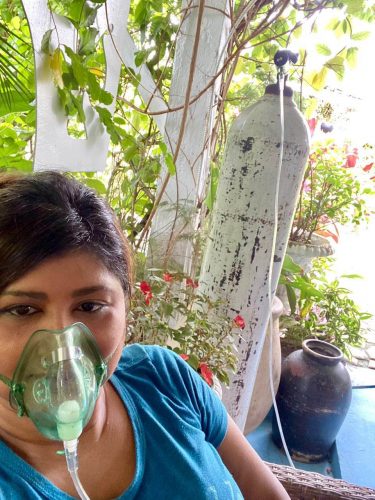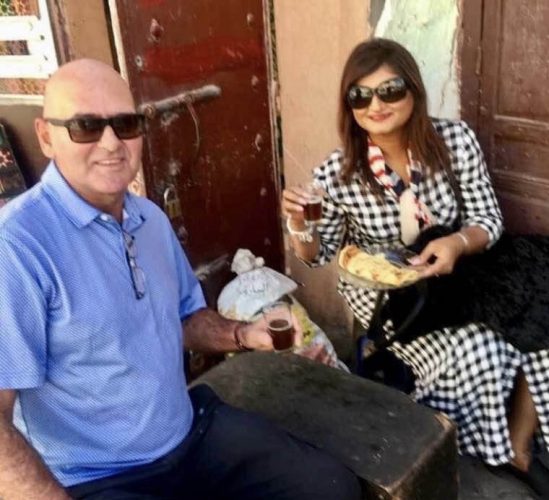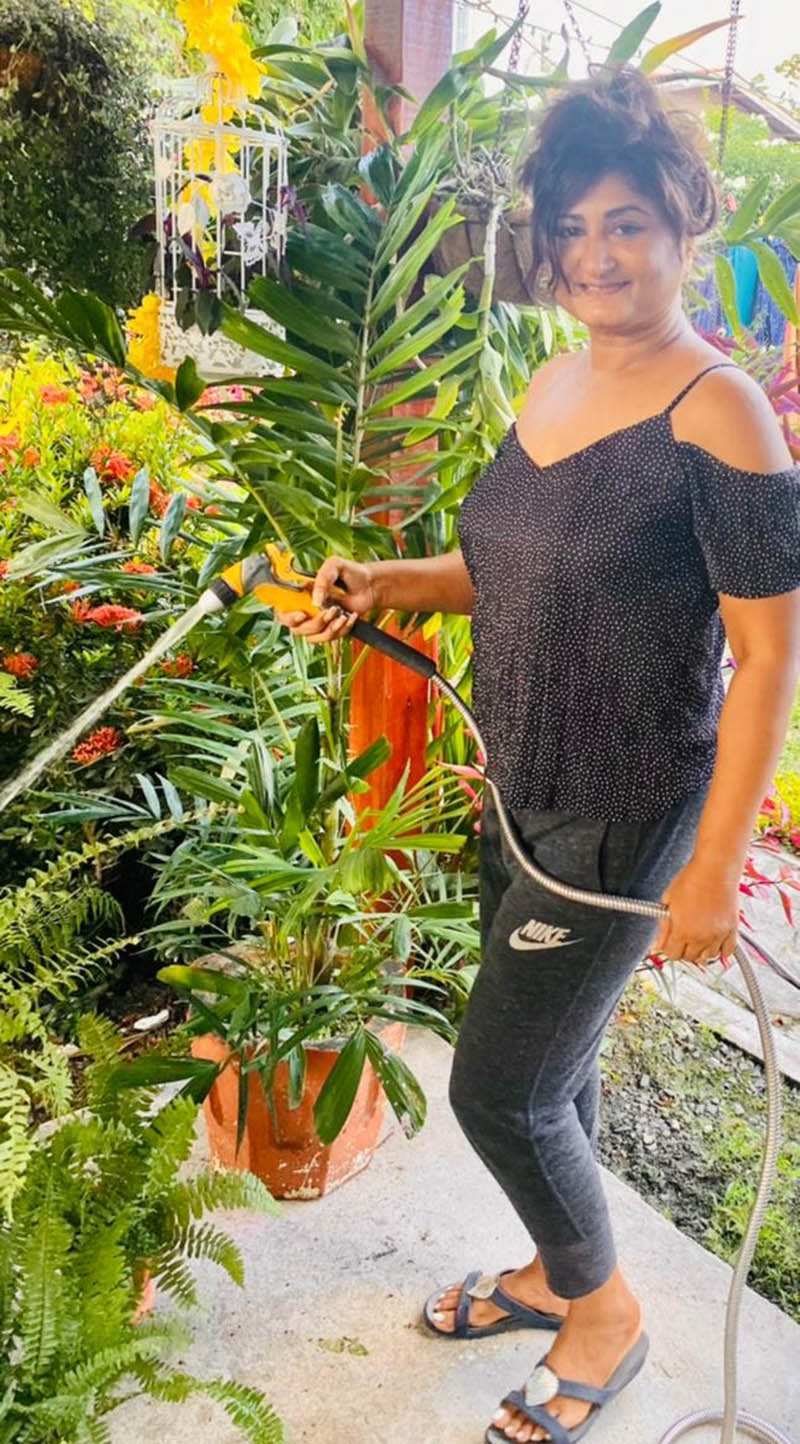After a near-death experience while battling COVID-19, which saw her having to be administered oxygen for 58 days, Nisa Walker is happy to finally be able to breathe on her own again and has a deeper appreciation for life.
“Whenever I gasped for air, I would realise how precious life is. But there were times when I had meltdowns and I would think that everyone is breathing the air that is free but it is not free to me. Sometimes I would question myself: ‘Why did I live and so many other people die?’ Many times I got frustrated and was feeling sorry for myself but I quickly snapped out of it and regained the strength to carry on,” Walker told Sunday Stabroek.
Walker, the owner/chef at Oasis Café, knew the seriousness of the virus and took all of the necessary precautions to avoid contracting it as she was high risk due to an existing underlying condition. However, on May 6, three days after having flu-like symptoms, she ended up with a positive result.

It all started with flu-like symptoms and feelings of listlessness but she thought it was the usual exhaustion from work and that she just needed to rest.
On the fourth day, her condition worsened when she developed a fever and breathing issues. Fears that she may have the virus gripped her and she asked her son, Dylan, to take her for a COVID-19 test.
She reeled in “shock and disbelief” at the result, even though she was partially expecting it by then.
She was sent to the COVID-19 unit at the Georgetown Public Hospital where she was treated intravenously and with steroids shots.
The health workers kept monitoring her oxygen saturation levels, which were not alarmingly low. This

made her believe that she would have been free to go home and quarantine while continuing with treatment.
She was crushed when they informed her that because of her underlying condition, she had to be taken to the Infectious Diseases Hospital at Liliendaal, East Coast Demerara, later that evening.
She described the situation there when she arrived as being “dreadful!”
“I felt like I am going through the gates of hell and the only thing missing is hellfire… It was late at night and it was eerily quiet,” she recalled.
At first, she was “placed in a big open room” alone, before being taken into the ward where the male patients were on one side and the female patients on the other.
“Some people were crying, some groaning in pain, some were coughing and some were calling out to nurses for help,” Walker recalled.
“It was just very, very depressing and I felt like I was going in there and I may never come out… I felt so lonely and isolated because this coronavirus is like a really lonely illness with no support from family while you’re in there.”
She remembered too: “There was this lady who was naked and crying and even the guys were walking around without their hospital gowns because their condition was so low, they didn’t care.”
She related that her stay there was just generally depressing and that she “couldn’t sleep because I was not sure what could have happened if I did…, that I may never wake up.”
As she laid there trying to process what was happening to her, a woman started pulling her toes, asking her where her children were.
The woman was also trying to get the window open so she could jump out to walk home.
“She was delirious because she had lost a son two weeks prior, in the US and there was no closure. Relatives had just dropped her off [at the facility]…” from the Corentyne.
She remembered being annoyed at the woman for disturbing her and for being so noisy. But the next morning “I spoke to her and when I heard her story, I felt so sorry for her.”
Walker desperately wanted to leave the facility and was determined not to spend another night there.
When the doctor visited the ward, he informed her that she had to spend another 13 nights there. Disheartened, she pleaded with him to send her home and promised that she would self-isolate.
He refused at first because she needed to be treated for pneumonia but she insisted that she must go home.
“I told him that I had the convenience and the space at home and I would self-isolate and get the treatment. I told them that my brother-in-law is a doctor and he would take care of me,” she recounted.
“I was convinced that if I stayed there I would not make it out alive and I called Will and told him, ‘If you ever want to see me alive again, get me out of here’!”
He “made a few calls and a couple of doctors came and questioned me about the room at home and if it would be safe. I promised them that I would get the best care and that I just wanted to go home.”
She was excited when the doctors inquired how soon someone could get her and she found the energy to jump up and told them, “right away!”
Assisted breathing
However, Walker was not prepared for the horrors she would face as she struggled to breathe and overcome the virus that had invaded her body. She developed pneumonia, which caused damage to her lungs, making it impossible for her to breathe on her own.
Her brother-in-law, Dr. Syed Ghazi, said he would have preferred if she had stayed a little longer at the hospital “but it was her bold decision to go home. With underlying high risk health issues I was very scared. But in consultation with all my COVID-19 specialist colleagues around the globe, I started her treatment.”
He said the “first thing was to get an oxygen tank and it was a weekend. Her oxygen going down. Every moment was important. Without oxygen she would go down fast. [The] situation was critical enough to make me nervous. What if we don’t get oxygen in time? What is going to happen then? God helped and through an angel I got it.”
He sourced a small tank of oxygen but it was nothing compared to what was required to keep her going. They ended up getting five tanks of oxygen, weighing 150 pounds each. One tank would last for a little under 24 hours.
The first few days her energy was drained and she has vague recollection of what transpired.
Her husband, Will, told her that she could have barely lifted her head off the pillow and could only eat a few bites. “I was too weak to chew and swallow food. I just wanted tea.”
She remembered that she was always “crying continuously” and as a result, her son, Dylan, could not bear to look at her when he went to get the empty oxygen tanks and replacing them with filled ones.
On the fourth day, she had a strange encounter. “I must have been sleeping and I heard voices. Then I saw a white light and I felt like an ‘out of body experience.’ And I felt for sure there was a sense of peace coming out of me,” she recalled.
“I felt like I’m about to go follow this light and as though my soul was leaving… I felt that wherever this was taking me I was ready to go. I was very calm… And then I heard Will’s voice. He was saying, ‘Nis, can you hear me, stay with me Nis, hang on, hold tight, you’re gonna get through this. Don’t give up’!”
She opened her eyes and just kept crying. “All I was seeing was [her daughter] Bobbi’s face and thinking I would never see her again.”
“It was a very poignant moment and I spent a lot of time lying down and sitting on the recliner, refusing to sleep because I felt like I would never wake up,” she remembered.
Even though she was relieved when she tested negative three weeks later, Walker was nowhere near coming off the oxygen.
The first few days were dark and she felt sad and she only cheered up when she heard that Bobbi, who lives in Wisconsin, USA, was coming to see her.
Bobbi was fully vaccinated and was not afraid of contracting the virus because her mother was “no longer contagious.”
Instinctively, she knew she had to be there for her mother when she video-called her and saw her with the oxygen mask on, crying and panting for breath as she tried to speak.
Bobbi spent 10 days and “mothered” and nurtured her, while giving her showers and pampering her with massages.
It was difficult for Walker when it was time for Bobbi to leave, but she knew she had to keep on fighting and continued with her breathing exercises.
Support system
Walker kept pushing to slowly wean herself off the oxygen, first for five to 10 minutes, then 15 minutes, 20 minutes, half hour and then to an hour.
It took about two weeks until she was able to go without it for three hours and she eventually started sleeping without it.
“I realised that my body is getting stronger and I started pushing it. All the while I would do diaphragmatic breathing while sitting or standing and they really helped,” she noted.
She also said that proning, which is beneficial to COVID-19 patients and which Dr. Ghazi advised her to do, helped.
He explained that proning involves a process of “lying on your stomach. It helps to clear base of the lungs and helps in breathing easily without a ventilator by increasing the lung capacity.”
In the beginning, she was only able to take three breaths on her own before starting to cough and gasp for air. “That used to frustrate me because I used to do over 2,000 breathing exercises in repetition during yoga sessions and to not being able to do three, I felt so desperate. Now I practice pranayama, which is called Kapalbhati, and I try to do at least 1,000 to 1,500 every day,” she said.
Her husband kept checking her saturation level and adjusting the oxygen constantly. “I started with six units but towards the end I was surviving on 1.5.” She was elated when she was able to leave the house “for the first time in 48 days to go for a drive and became very emotional when I stepped out of the gate. But I had to pack the oxygen.”
The best part of coming off the oxygen was “being able to find solace in my garden and be among my plants… I missed cooking and I missed gardening.”
She felt fortunate to be surrounded by genuine people who checked in constantly through calls and messages, or dropped off food and the home remedies, which she felt also worked wonders. She desperately wanted to get help, and along with the medical treatment tried “whatever people tell me would help. People were dropping off the juice of broad-leaf thyme, as well as lemon grass tea with ginger.”
However, her biggest support and care came from Will, who did not leave her side, even if it meant sacrificing his own health and contracting the virus. He ended up testing positive but was asymptomatic.
Will was terrified to leave her on her own when it was time to return to work, he insisted that someone should be with her the entire time while he was away.
She was also grateful to Dr. Ghazi, for setting her up “hospital-style” at her home with the oxygen and provided her with treatment. He also stayed in constant contact with Will via phone, to monitor her condition, while her friend, Rita, also offered support and sourced information on treatment.
According to Ghazi, “She made it through her own perseverance and with prayers and supportive immunity enhancing medications and postural adjustments to increase lung capacity and reassurance as well as remarkable support from Will, Dylan and Bobbi.”
He also said that “it was one of the longest fights I saw since the arrival of this nasty virus… All praises to God…”
In spite of her suffering, Walker said the virus has impacted her in a positive way and that she “would never take life for granted again. Life is precious and it can be snatched away from you in the blink of an eye.”
Realising that one of the long term effects of this virus is depression, she found a way of preventing that from happening by getting closer to God through prayers and listening to motivational lectures by an Islamic scholar (Mufti) Ismail Menk, as well as duas (supplications) and recitations from the Holy Quran, repeatedly. “I believe even more now in the power of prayers,” Walker told this newspaper. “The prayers of my parents, siblings, relatives, friends, my staff and so many other people, really helped.”
She also encouraged others to “appreciate your family and those around you because you can lose each other. This pandemic is far from over and I strongly urge people to get vaccinated and to take it seriously; wear their mask, social distance and sanitize.”
She said, too, that in the beginning people took the virus more seriously but now they are getting more relaxed about it and noted that it is still quite serious and it “doesn’t discriminate against race, religion and status.”





